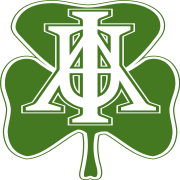
Back Irlandar Aliantza Unionista Basque Parti unioniste irlandais French Comhaontas Aontachtach na hÉireann Irish Alleanza Unionista Irlandese Italian
Irish Unionist Alliance | |
|---|---|
 | |
| Leader | Colonel Saunderson (First) The 11th Baron Farnham (Last) |
| Founded | 1891 |
| Dissolved | 1922 |
| Merger of | Irish Conservatives Irish Loyal and Patriotic Union |
| Succeeded by | Ulster Unionist Party |
| Ideology | Conservatism Irish unionism Anglo-Irish interests |
| Political position | Right-wing |
| National affiliation | Conservative Party |
The Irish Unionist Alliance (IUA), also known as the Irish Unionist Party, Irish Unionists or simply the Unionists, was a unionist political party founded in Ireland in 1891 from a merger of the Irish Conservative Party and the Irish Loyal and Patriotic Union (ILPU) to oppose plans for home rule for Ireland within the United Kingdom of Great Britain and Ireland. The party was led for much of its existence by Colonel Edward James Saunderson and later by St John Brodrick, 1st Earl of Midleton. In total, eighty-six members of the House of Lords affiliated themselves with the Irish Unionist Alliance, although its broader membership among Irish voters outside Ulster was relatively small.
The party aligned itself closely with the Conservative Party and Liberal Unionists to campaign to prevent the passage of a new Home Rule Bill. Its MPs took the Conservative whip at Westminster, and its members were often described as 'Conservatives' or 'Conservative Unionists',[1] even though much of its support came from former Liberal voters. Among its most prominent members were the Dublin barrister, Sir Edward Carson, and the founder of Ireland's cooperative movement, Sir Horace Plunkett. Its electoral strength was largely (although not exclusively) concentrated in east Ulster and south Dublin.
The IUA became wracked by internal disagreement during the early twentieth century, with the issue of the partition of Ireland proving to be particularly divisive. Many unionists outside Ulster became resigned to the political necessity of Home Rule, while unionists in Ulster established a separate organisation, the Ulster Unionist Party (UUP). In 1919 the IUA finally split apart with the founding of the break-away Unionist Anti-Partition League, effectively signalling the death of institutional unionism in most of Ireland. The UUP continued to operate in Northern Ireland, and would go on to dominate domestic politics there for much of the twentieth century.
- ^ B. M. Walker, 'Political affiliations' in Parliamentary Election Results in Ireland, 1801–1922 (Royal Irish Academy, 1978), xiv.